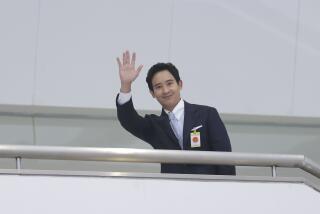Opposition Apparent Victor in Thailand : Asia: Group accused of buying votes takes early lead. U. S. has alleged party officials have ties with drug trade.
- Share via
BANGKOK, Thailand — In a major political shift for Thailand, an opposition party suspected of widespread vote buying appeared to have thwarted Prime Minister Chuan Leekpai’s efforts Sunday to win a second term.
The apparent victory of the Chart Thai, or Thai Nation, party also raised the prospect of an immediate diplomatic crisis with the Clinton Administration. Three senior officials of the party have been refused visas to visit the United States because of allegations of involvement in the narcotics trade, but Chart Thai leaders have said they will ignore the U.S. allegations in choosing government ministers.
Although there were no official returns Sunday night, projections by Thai television stations gave Chart Thai 91 seats in the new 391-seat lower house of Parliament and Chuan’s pro-reform Democrat Party 86 seats.
While neither party has enough seats to form a government on its own, by tradition the party with the most seats is given the first chance to form a coalition government.
“I am ready to be in the opposition,” a gloomy Chuan told a news conference Sunday night as the returns showed a trend against him.
Chuan was swept to power in September, 1992, on a wave of pro-democracy sentiment that followed violent street demonstrations against military interference in politics. While Chuan is respected for his integrity in office, his party lost credibility because of a land scandal and was abandoned by a key coalition partner--the Palang Dharma, or Righteous Force, party--forcing him to dissolve Parliament and call new elections.
A Chart Thai victory probably will hand the premiership to the boss of the party’s well-oiled political machine, Banharn Silapaarcha.
Widely known as Deng because his diminutive size draws comparisons with China’s senior leader, Deng Xiaoping, Banharn is a multimillionaire businessman who has variously served as minister of finance, industry, interior and commerce.
Banharn exercises absolute political control over Suphan Buri, a provincial capital, where there are six high schools named after him and his wife, Jamsai, as well as parks, gardens and a bell tower.
Banharn has been on the defensive for much of the campaign because his party has been widely accused by non-governmental organizations and vote-monitoring groups of using millions of dollars to buy the votes of entire communities.
In one rural town Thursday, police arrested a couple on charges of possessing the equivalent of $44,000 in Thai currency stapled to slips with the names of Chart Thai candidates in the area. Another Chart Thai official was arrested Friday on vote-buying allegations.
But Chart Thai was not the only party accused of irregularities. Several other leading parties, such as the New Aspiration Party and the Chart Patthana, or National Development, party were also accused of spending large sums to win seats in rural districts.
But Chart Thai may face its biggest problem if it goes ahead with plans to appoint party leaders Narong Wongwan and Watana Asavahame as ministers. Both men, along with Mongkol Chongsuttharamanee, a newly elected member of Parliament, have been identified by the State Department as being on a watch list of suspected drug dealers.
All three have denied the charges, and Watana has announced that he plans to sue former President George Bush for defamation.
An effort in 1992 to appoint Narong prime minister was a fiasco because of the drug allegations, setting the stage for a former general to take power briefly before being forced out himself by weeks of street demonstrations.
More to Read
Sign up for Essential California
The most important California stories and recommendations in your inbox every morning.
You may occasionally receive promotional content from the Los Angeles Times.













